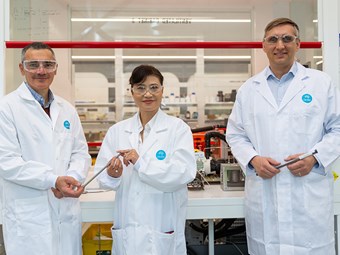
That concept is coming to life right now thanks to Australia’s chief scientific organisation, the CSIRO, and its Hydrogen Industry Mission which is dedicated to supporting a commercially viable Australian hydrogen industry.
It is an industry with the potential to generate more than $50 billion of additional Gross Domestic Product (GDP) for the country by 2050. It could also reduce Australia’s current fossil fuel emissions by a third when compared to now.
This week CSIRO and research and innovation company Advanced Carbon Engineering announced a $10 million, six-year, project to turn a proven idea into a commercially viable solution to be sold in Australia and overseas.
The project will see CSIRO scientists build a demonstration unit based on patented technology to efficiently generate hydrogen from liquid carriers.
The use of a liquid carrier enables hydrogen to be safely and efficiently stored and transported in tanks from where it is produced – like a remote solar or wind farm – to where the energy is to be used.
CSIRO’s Deputy Hydrogen Industry Mission Lead Dr Vicky Au says the project will be the first unit using Australian technology to produce hydrogen from a liquid carrier, and addresses some of the key challenges to the growth of the hydrogen sector.
"Australia has the potential to become an energy superpower through hydrogen, but we need to find better methods of safely transporting and storing it at scale," Dr Au says.
"To get the hydrogen industry moving, we need to be able to get hydrogen where it will be used by the consumer.
"This generator unit will do just that and will be compact enough to move to where it’s needed – whether that’s a farm, a festival, an industrial facility or, a mine site.
"The power of industry and research coming together cannot be overstated when delivering the solutions needed for a sustainable future."
CSIRO Researcher Dr John Chiefari says CSIRO’s patented catalytic static mixers would be central to the development of the new hydrogen generator.
"Catalytic static mixers are special tools that mix fluids to speed up and better control chemical reactions without any moving parts," Dr Chiefari says.
"This level of control allows the process to be highly scalable without the technical challenges that this usually entails. This gives us a key advantage over the current packed bed reactor technology.
"The technology to add hydrogen to a carrier fluid is already established. Now this hydrogen generation system will enable hydrogen to be produced locally and on demand from the carrier, with the added advantages of the carrier fluid being safely stored in a similar way to diesel or petrol."
"This would be a big step forward with a goal to be able to store the fuel in standard tanks and manage it using existing diesel or petrol infrastructure."
Advanced Carbon Engineering CEO Jon McNaught says his company is invested in helping the country to move to a zero emissions future by conducting critical research, facilitating innovative discoveries and building new industries.
"Innovation is vital for humanity's future, driving progress and economic growth, solving challenges, creating opportunities, and ensuring a sustainable future for generations," McNaught says.